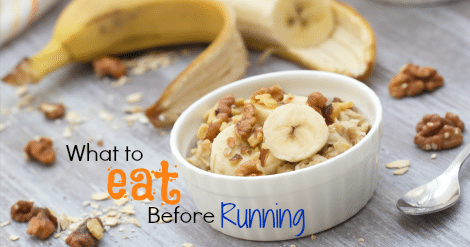What should I eat before I partake in athleticism?
It’s an age-old question faced by many runners both new to the sport and those who have been training seriously and are looking to fine tune their training diet.
While you won’t find one specific super food that works for every runner, by providing some simple guidelines on nutritional requirements and timing, this article will help you find the perfect food for your pre-run snacks or meals.

Step 1: Timing Your Pre-run Meals
The most critical variable in the equation is timing – how long before your run can you, or should you, eat.Here’s the deal:
Like most aspects of training, finding the optimal time to eat before a run is an individual preference.
I can run within 15-20 minutes of eating almost anything short of a full meal and have no stomach issues whatsoever.
Conversely, my wife can’t muster a step out the door if she’s eaten anything within 2 hours or the run. You need to find work works for you.
Here’s how:
Conduct an experiment
To find your optimal timing window, try eating a medium sized snack 90 minutes before your next run (see the last section of this article for what constitutes a medium sized snack).If your stomach handles it well, try moving the same snack forward 15-20 minutes.
Likewise, if you experience stomach issues, push back the timing of your snack 15-20 minutes.
Keep moving forward or backward 15-20 minutes per run until you find the closest time you can eat before you start experiencing stomach or cramping issues.
Now you have a concrete number for how close to your run you can eat, which is the first step in determining your optimal pre-run meal or snack.
This is important:
In general, the harder you have to run, the further back your snack should be from this time threshold. Likewise, the larger the meal or snack, the further you’ll have to push back from your closest pre-run eating time.
Step 2: Determine the Nutritional Demands of Your Run
I think most runners severely over estimate the number of calories they burn and the amount of carbohydrates they need to complete runs under 90 minutes. The body has enough glycogen stored in the muscles from your normal diet to run at marathon pace for right around 2 hours.This means that you don’t need to load up on carbohydrates or calories before most of your normal training sessions, but might want a little extra fuel for harder workouts or long runs
Demands of a Normal Easy Training Run
A 155 pound runner will burn between 600 and 700 calories on a 60 minute run depending on their pace and effort level.To see how many calories you burn while running, you can try our running calorie calculator. Since you already have enough fuel in your muscles to run for 2 hours, and you might only burn between 600-700 calories, you don’t need a huge snack or meal before you head out the door.
Remember this:
For normal easy run days, a small snack 30-90 minutes before your run is all you need to stave off hunger and provide a small boost to your blood sugar levels.
Long Runs and Harder Workouts
If you have a long run or workout that is going to take more than 90 minutes to complete, you should try and get a little something in your stomach to give you some extra fuel.A medium sized snack or small meal 30-120 minutes before your run is optimal. The amount of time you need to eat before your run is dependent upon your timing experiment from step one.
Morning Runners
For early morning runners, you might have a little less glycogen stored in your muscles since you’re coming off 6-8 hours of not eating, but unless you have a long run or a really hard workout, you don’t need to worry too much about eating something before running.If you do have a longer run scheduled, try a small snack about 30 minutes before you head out the door. Otherwise, you don’t have to worry too much.
3. Find a Food That Sits Well in Your Stomach
The most important aspect of a pre-run meal is finding something that agrees with your digestive system.While bananas may be perfect for your running friend, they give me heart burn, so I avoid them. Likewise, you need to experiment on your easy training runs to see what works best for you. This way, on important workout days and race day, you’ll know exactly what foods sit well with you.
Here’s the deal:
You’re looking for easily digestible foods. Avoid fatty or high fiber foods, which sit in your stomach and take longer to digest. Ideally, you want a snack with a good blend of simple and complex carbohydrates and maybe a dab of protein to help you feel more full.
Need Some Pre-run Snack Ideas?
Small Snacks
Energy bars – These tend to be light on the stomach and easy to digest. Avoid diet products, as these often cut the carbs, which is exactly what you’re looking for. Natural energy bars – A Granola bar is a great way to eat more natural, but still stick with a light snack filled with carbs.Banana – High in carbs and potassium
Small bowl of oatmeal – while oatmeal tends to have a good amount of fiber, it can be a good solution for runners who can’t eat close to running, but need something small to sustain them.
Culled from https://runnersconnect.net
Read more @ WhatUate.blogspot.com
No comments:
Post a Comment